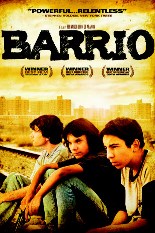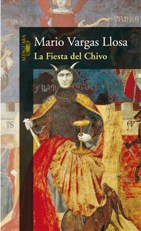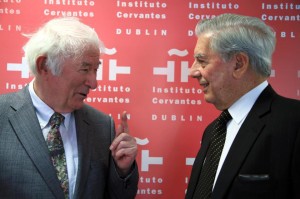Blog del Instituto Cervantes de Dublín
Torre Martello
Frida Kahlo at the Instituto Cervantes in Dublin / Frida Kahlo en el Instituto Cervantes de Dublín
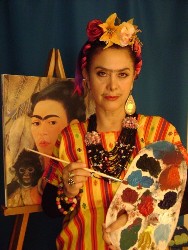 Two years ago, we had the opportunity to enjoy the musical show “Frida Kahlo…Love, Pain, Passion and Songs”. Tomorrow, thanks to the collaboration of the Embassy of Mexico in Ireland, Frida Kahlo / Ana Salas will perform again this artistic work based on the life of the great painter Frida Kahlo. Don’t miss it!
Two years ago, we had the opportunity to enjoy the musical show “Frida Kahlo…Love, Pain, Passion and Songs”. Tomorrow, thanks to the collaboration of the Embassy of Mexico in Ireland, Frida Kahlo / Ana Salas will perform again this artistic work based on the life of the great painter Frida Kahlo. Don’t miss it!
Como ya hiciera hace dos años, Frida Kahlo / Ana Salas estará mañana con nosotros, en el Instituto Cervantes de Dublín, presentando su espectáculo “Frida Kahlo…Amor, Dolor, Pasión y Canción”.
Este es un espectáculo biográfico musical que nos llega de la mano de le Embajada de México en Irlanda y que tiene como tema central la vida de la gran pintora Frida Kahlo. ¡Anótalo en tu agenda!
Culture Night 2013 | Noche de la cultura 2013
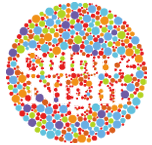 Welcome to Instituto Cervantes at Dublin Culture Night 2013! We have several surprises waiting for all of you who visit our cultural centre during this special cultural night. You cannot miss this great event on September 20th from 6pm to 10pm.
Welcome to Instituto Cervantes at Dublin Culture Night 2013! We have several surprises waiting for all of you who visit our cultural centre during this special cultural night. You cannot miss this great event on September 20th from 6pm to 10pm.
Join us for the art exhibition In a faceless world by renowned Spanish artist Amaya Bozal. There will also be a Latin American handicraft market, an ex-library and second-hand book sale, music andfood to tickle your cultural taste buds.
¡Bienvenidos al Instituto Cervantes de Dublín en la Noche Cultural 2013! Este año tenemos varias sorpresas para celebrar con todos los visitantes esta única y muy especial noche cultural. No te pierdas este fantástico evento el día 20 desde las 18:00 de la tarde hasta las 22:00 de la noche.
Desde las 6 de la tarde, ven a visitar nuestraexposición de pinturas En un mundo sin rostro, de la reconocida artista española Amaya Bozal. En nuestro Café Literario podrás disfrutar de una feria de artesanía latinoamericana y música, además de premiar a tu paladar con degustación de comida típica española y latina.
También podrás llevarte alguna buena lectura en laventa de libros organizada en nuestra biblioteca.
Hispanic Heritage Month Celebrations / Celebraciones del Mes de la Herencia Hispánica
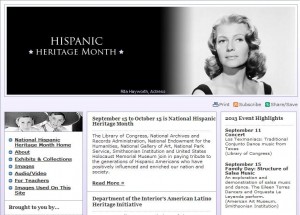 Each year, Americans observe National Hispanic Heritage Month from September 15 to October 15, by “celebrating the histories, cultures and contributions of American citizens whose ancestors came from Spain, Mexico, the Caribbean and Central and South America”.
Each year, Americans observe National Hispanic Heritage Month from September 15 to October 15, by “celebrating the histories, cultures and contributions of American citizens whose ancestors came from Spain, Mexico, the Caribbean and Central and South America”.
As the Library of Congress recognises, “it seems a bit strange that in contrast to all the other “heritage” celebrations and recognitions, the one for Hispanic Americans starts in the middle of the month”. But there are good reasons indeed for that selection.
Happy Hispanic Heritage Month!
Cada año, en Estados Unidos se celebra el Mes Nacional de la Herencia Hispánica desde el 15 de septiembre hasta el 15 de octubre, conmemorando las historias, las culturas y las contribuciones de los ciudadanos norteamericanos de ascendencia española, mexicana, caribeña, centroamericana y suramericana.
Como explica el blog de la Biblioteca del Congreso de los Estados Unidos, parace un poco extraño, en contraste con otras celebraciones y reconocimientos, que la de los hispanoamericanos comience a mediados de mes. sin embargo, hay buenas razones para esta elección.
¡A celebrar pues! ¡Feliz Mes de la Herencia Hispánica!
Audiobook of the week | Audiolibro de la semana: Cuentos de hombres
Cuentos de hombres by Susana Pérez Alonso is our recommendation of the week. The protagonists of the nine stories in this book are women indeed. Active, determined and independent 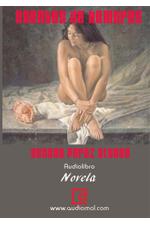 women. Therefore they are not willing to give up the pleasures and suffering involved in living with the opposite sex. Our audiook download service is very easy to use. You just need your library card and click here.
women. Therefore they are not willing to give up the pleasures and suffering involved in living with the opposite sex. Our audiook download service is very easy to use. You just need your library card and click here.
Cuentos de hombres is a mosaic of lives in which women may find themselves and identify, and men, why not, will learn to know those who have at their side.
Cuentos de hombres de Susana Pérez Alonso es nuestra recomendación de la semana. Las protagonistas de las nueve historias que componen este libro son, efectivamente, mujeres. Mujeres activas, decididas, independientes, que no por ello están dispuestas a renunciar a los placeres y los sufrimientos que conlleva la convivencia con el sexo opuesto. Nuestro servicio de audiolibros es muy sencillo de utilizar. Tan solo necesitas tu tarjeta de la biblioteca y pulsar en el enlace.
Cuentos de hombres compone así un mosaico de vidas en las que las mujeres podrán encontrarse a sí mismas e identificarse, y con las cuales los hombres, por qué no, aprenderán a conocer a quienes tienen a su lado.
Dublinesque in Dublin / Dublinesca en Dublín
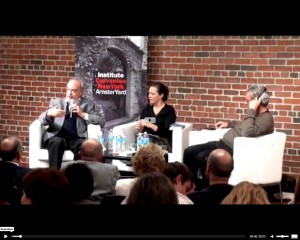 Less than a year ago, Catalan writer Enrique Vila-Matas presented in New York the English translation of his novel Dublinesque, accompanied by his friend Paul Auster.
Less than a year ago, Catalan writer Enrique Vila-Matas presented in New York the English translation of his novel Dublinesque, accompanied by his friend Paul Auster.
In Dublinesque, Samuel Riba, a successful publisher in Barcelona, decides to visit Dublin, a city he has never visited but once dreamed about, on the pretext of honouring James Joyce’s Ulysses on Bloomsday.
Enrique Vila-Matas explains all this much better in his own words in this video recorded at the Instituto Cervantes in New York. We invite you to watch it as a foretaste of what you can see during the Isla Literary Festival that will take place next month in Dublin.
Enrique Vila-Matas is one of our guest writers and he will participate in a round table discussion on Saturday morning with John Banville and Eileen Battersby. He will also participate in the reading session scheduled for Friday, October 18th.
Enrique Vila-Matas presentó en Nueva York, hace poco menos de un año, la traducción al inglés de su novela Dublinesca, acompañado por su amigo Paul Auster. Enrique Vila-Matas contaba entonces cómo su libro es un viaje al corazón de Dublín, de la mano de un editor que convence a sus amigos para que visiten la ciudad de Joyce y Beckett.
Enrique Vila-Matas lo explica mucho mejor en este vídeo que ahora os proponemos, como anticipo de lo que podréis ver durante el Festival Isla de Literatura que se celebrará en nuestro centro el próximo mes de octubre y donde Enrique Vila-Matas será uno de los escritores invitados.
Enrique Vila-Matas participará en una mesa redonda el sábado por la mañana junto a John Banville y Eileen Battersby y también participará en la sesión de lecturas programada para el viernes, 18 de octubre, por la tarde.
Teaching Spanish as a foreign language / Cursos para profesores de español como lengua extranjera
 A new academic year starts in September and we can find everywhere new courses to be trained in different fields of knowledge. Teaching Spanish as a foreign language is one of the more demanded careers in recent years. To cover that demand, Instituto Cervantes offers a good number of online courses.
A new academic year starts in September and we can find everywhere new courses to be trained in different fields of knowledge. Teaching Spanish as a foreign language is one of the more demanded careers in recent years. To cover that demand, Instituto Cervantes offers a good number of online courses.
Now, wherever you are, if you are connected to the Internet, you can become a teacher of Spanish as a foreign language, thanks to the Instituto Cervantes. Check out our video!
Comienza el curso académico y con él una avalancha de ofertas de formación en las más diferentes disciplinas. Una de las que tiene mayor demanda en el mercado es la de profesor de español como lengua extranjera. Para cubrir esa demanda, el Instituto Cervantes ofrece un buen número de cursos en línea.
Ahora, estés donde estés, si estás conectado a la red, puedes formarte como profesor de español, con la garantía del Instituto Cervantes. Dentro vídeo.
Isla Literary Festival 2013 / Festival Isla de Literatura 2013
 Instituto Cervantes Dublin is pleased to present the second edition of the Isla Festival of Literature.
Instituto Cervantes Dublin is pleased to present the second edition of the Isla Festival of Literature.
This is a unique opportunity to attend a gathering of Irish and Hispanic literature where you will enjoy round tables, readings and other parallel events during three consecutive days. This year, on the second edition of this festival we will have 16 authors from Argentina, Chile, Cuba, Ireland, Mexico and Spain. Poetry, novel, essay, theatre and cinema will be the main characters of a pluralistic program for all audiences.
The ISLA Festival or Irish, Spanish and Latin American Literary Festival is a cultural initiative in Ireland carried out by the Instituto Cervantes Dublin in collaboration with the Embassies of Argentina, Chile, Cuba, Spain and Mexico, as well as Dublin UNESCO City of Literature, Ireland Literature Exchange, Poetry Ireland and with kind support of Dublin City University, Trinity College Dublin, NUI Galway and NUI Maynooth.
Poco más de un mes para que de comienzo el Festival Isla de Literatura 2013. En este festival reuniremos a dieciséis escritores de Irlanda, España y Latinoamérica, tres días consecutivos con mesas redondas, lecturas y otros eventos paralelos. En esta edición, contaremos con 16 autores provenientes de Argentina, Chile, Cuba, Irlanda, México y España. Poesía, novela, ensayo, teatro y cine, serán los protagonistas de un programa plural y para todos los públicos.
El Festival ISLA (Irish Spanish Latin American Literary Festival) es una iniciativa cultural puesta en marcha en Irlanda por el Instituto Cervantes de Dublín con la colaboración de las Embajadas de Argentina, Chile, Cuba, España y México, Dublin UNESCO City of Literature, Ireland Literature Exchange, Poetry Ireland y el apoyo de las universidades Dublin City University, Trinity College Dublin, NUI Galway y NUI Maynooth.
Exhibition: In a faceless world. Paintings and sculptures by Amaya Bozal | Exposición: En un mundo sin rostro. Pinturas y esculturas de Amaya Bozal
Next Thursday, we open the exhibition In a faceless world with the paintings and scultures by Amaya Bozal. You can enjoy 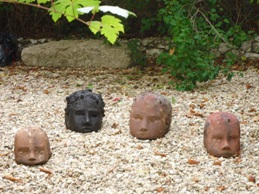
this exhibition until 17th October. The opening hours are Mon-Thu 2-7pm and Sat 10am-2pm.
Through the verses of Samuel Beckett, “what would I do without this world faceless incurious, where to be lasts but an instant”, Amaya Bozal brings to mind thoughts of fragility and violence, the starkness of the passage of time. A world wherefaces don´t belong to real people, they are archetypes, childlike heads painted with earth and gold, moulded in clay like ancient funeral masks, like the remains of an ossuary; fragments of female bodies, earth consumed by fire; wax and clay flowers punctured with old nails. This reflection conveys a depersonalized world, where femininity is only saved by its historic connection with nature.
Amaya Bozal (1972, Madrid) takes something from her classical and archaelogical training, that is reflected in all of her work – a craft she has been developing for over 20 years. She has exhibited in some of the biggest galleries – Sen, Rayuela, Fernández Brasso, Marlborough, Paul Sharpe Contemporary Art – and has participated in ARCO, ArteBA, FIA, and ArtMiami. Her work is visible in the best public and private collections in Europe. Currently, she continues to work in her studio in the mountains near Madrid, using wind, fragments of fallen trees and ancient techniques like fired clay, gold leaf and wax.
El próximo jueves día 12 inauguramos una nueva exposición: En un mundo sin rostro, con las pinturas y esculturas de la artista Amaya Bozal. La exposición permanecerá abierta hasta el 17 de octubre. Las horas de visita son de lunes a jueves de 14: 00 a 19:00 y los sábados de 10:00 a 14:00.
A partir de los versos de Samuel Beckett, “que haría yo sin este mundo sin rostro, sin preguntas, donde ser no dura sino un instante”, Amaya Bozal plantea una reflexión sobre la fragilidad y la violencia, lo descarnado del paso del tiempo. Un mundo donde los rostros no pertenecen a personas concretas, son arquetipos, cabezas infantiles pintadas con tierra y oro, moldeadas en barro como las antiguas máscaras funerarias, como restos de un osario; fragmentos de cuerpos femeninos, tierra devorada por el fuego; flores de cera y barro atravesadas por clavos antiguos. Todauna reflexión sobre un mundo despersonalizado, donde la feminidad sólo se salva en su comunión ancestral con la naturaleza.
Amaya Bozal (1972, Madrid) procede de formación clásica y arqueológica, algo que se trasluce en toda su obra, que viene desarrollando desde hace más de veinte años. Ha expuesto en las mejores galerías, Sen, Rayuela, Fernández Brasso, Marlborough, Paul Sharpe Contemporary Art y ha participado en ARCO, ArteBA, FIA, ArtMiami. Su obra está presente enlas mejores colecciones públicas y privadas de Europa. Actualmente, continúa trabajando en su estudio de la sierra de Madrid, utilizando el viento, fragmentos de árboles caídos y antiguas técnicas como la tierra chamotada, pan de oro o encáustica.
Audiobook of the Week | Audiolibro de la semana: Crímenes triviales
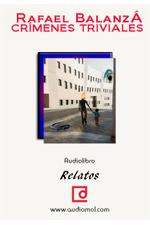 Here you are four disturbing stories that will drag you up to the limits of unease and strangeness. In Crímenes triviales by Rafael Balanzá you can hear the echoes of Kafka, Cortázar or Auster. To listen to the audiobook you just need your library card,click here and done! Just enjoy this story that won’t leave you indifferent.
Here you are four disturbing stories that will drag you up to the limits of unease and strangeness. In Crímenes triviales by Rafael Balanzá you can hear the echoes of Kafka, Cortázar or Auster. To listen to the audiobook you just need your library card,click here and done! Just enjoy this story that won’t leave you indifferent.
This is literature at the highest level. A well stocked prose, a skillful handling of the narration and its rhythms, the ability to involve us in an atmosphere of anxiety and suspense, if not of mere terror, and, simultaneously, its deeply metaphysical importance, make of Crímenes triviales a rich work, not trivial at all.
He aquí cuatro narraciones perturbadoras que arrastra al lector a los límites del desasosiego y de lo extraño. En Crímenes triviales por Rafael Balanzá se escuchan los ecos de Kafka, Cortázar o Auster. Nos hallamos ante literatura del mayor nivel. Para escuchar este audiolibro solo necesitas tu carnet de la biblioteca, pulsar aquí y ¡hecho!, ya puedes disfrutar de esta historia que no te dejará indiferente.
Una prosa bien abastecida, un hábil manejo de la narración y de sus ritmos, la capacidad para envolvernos en una atmósfera de ansiedad y suspense- cuando no de mero terror-, y, a la vez, su hondo calado metafísico, hacen de Crímenes triviales una obra rica y nada trivial.”
Film screening and discussion: Other voices. A different outlook on autism | Proyección y charla: Otras voces. Una mirada diferente sobre el autismo
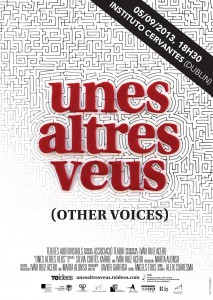 Ivan Ruiz, psychoanalyst and psychologist in Barcelona, will be at the Institute Cervantes Dublin to present his film Other Voices. A different outlook on autism. Being also an artist, photography and music are used in a unique way in the realisation of this film. The event will be at 6.30 in Café Literario.
Ivan Ruiz, psychoanalyst and psychologist in Barcelona, will be at the Institute Cervantes Dublin to present his film Other Voices. A different outlook on autism. Being also an artist, photography and music are used in a unique way in the realisation of this film. The event will be at 6.30 in Café Literario.
Other Voices is a documentary based on the testimony of Albert, a 21-year-old young man, diagnosed with Asperger’s Syndrome. His thoughts inside a maze, the conversations he has with a friend from his town and a trip to Brussels visiting the Tintin Museum bring us closer to his particular way of living and understanding the world.
The world of autism, approached from the perspectives of subjectivity, singularity and respect, is reflected in and reflected on through the testimonies of parents, grand-parents and psychoanalysts. A different view on autism that offers insight into the multiplicity of possible ways of being and surviving in the world. A song of dignity and, arguably, a question of civilization.
After the screening (English subtitles) there will be time for debate and dialogue with the audience.
Otras voces es un documental basado en el testimonio de Albert, un joven de 21 años al que se le ha diagnosticado el síndrome de Asperger, su viaje y el de los padres y abuelos de los niños diagnosticados con autismo. Un acercamiento de los psicoanalistas a un mundo distinto desde las perspectivas de la subjetividad, singularidad y respeto. Una visión del autismo que abre una ventana a otra forma de ser en el mundo. Un documental que constituye una oda de respeto y dignidad y una cuestión de civilización y derechos humanos. No te pierdas este evento hoy a las 18:30 en el Café Literario.
Después de la proyección se establecerá u debate y un turno de preguntas y respuestas con el público.
Iván Ruiz: psicoanalista, psicólogo, Presidente de TEAdir (Asociación de padres, madres y familiares de personas con un Trastorno del Espectro Autista), Director y productor de “Otras voces”, Miembro de la Escuela Lacaniana de Psicoanálisis (ELP) y la Asociación Mundial de Psicoanálisis (AMP)
Elías Querejeta, author of the month / Autor del mes
El pasado día 9 de junio falleció Elías Querejeta, una de las figuras más importantes del cine español. Fue el productor por excelencia y de su mano salieron muchas de las grandes películas de nuestro cine de los últimos cuarenta años. Los que le conocieron, a menudo destacan su faceta de productor-autor, dada su involucración total en los proyectos en los que participó, desde el guión y la preproducción hasta el montaje final.
Curiosamente, en su juventud fue futbolista profesional, jugando durante cinco años en primera división. Pero pronto decidió dedicarse a su gran vocación cinematográfica y se trasladó a Madrid, formando su propia productora en el año 63 y llegando a producir más de cincuenta películas en las que dio paso a un nuevo cine que rompió moldes especialmente en los conflictivos tiempos del franquismo y la transición.
Elías Querejeta es nuestro autor del mes septiembre.
Elías Querejeta, one of the most important figures of Spanish cinema, was the quintessential producer and he led many of the greatest Spanish films of the last forty years.
His double facet as producer-author and his total involvement in the projects where he participated, from the script and pre-production to the final editing is often mentioned by those who met him.
In his youth he was a professional football player and he played five years in the Spanish premier league. But soon, he decided to work in cinema, his real passion and he moved to Madrid, where he set up his own production company in 1963.
Remember: He is our author of the month for September.
The Best Novels of the 21st Century / Las mejores novelas del siglo XXI
¡Ya estamos de vuelta! Esperamos que todos hayáis disfrutado de las merecidas vacaciones veraniegas. Ahora es el momento de volver a nuestros autores, nuestros libros, nuestras películas favoritas. Seguro que con ellas no será menos penosa la vuelta a la rutina.
¿Recuerdas cuál era el tema que te propusimos para el verano? Todavía estás a tiempo de leer algunas de las mejores novelas del siglo XXI. Seguro que con ellas te resultará más llevadero el regreso a la rutina.
Ya hace trece años que inauguramos el siglo XXI y como no, paulatinamente empiezan a surgir listas que seleccionan lo más destacado de la literatura desde el comienzo del siglo.
En junio, el periódico ABC publicaba los resultados de la encuesta realizada a escritores, editores, agentes y personalidades de la cultura que elegían “La fiesta del chivo” del Premio Nobel Mario Vargas Llosa como la novela española más importante de lo que llevamos de siglo.
Desde la biblioteca coincidimos en que las obras seleccionadas tienen una indudable calidad literaria y las ponemos a tu disposición para que durante los meses de verano disfrutes de la mejor literatura española contemporánea.
- La Fiesta del Chivo. Mario Vargas Llosa. Ficción histórica ambientada en la dictadura de Trujillo supone una reflexión sobre la libertad desde el recuerdo. Está estructurada y ambientada magistralmente, colocándose entre las grandes obras de Vargas Llosa.
- Crematorio. Rafael Chirbes. Narra la vida de un empresario inmobiliario sin escrúpulos. Considerada el retrato perfecto de la crisis económica, política y moral de los últimos años.
- Tu rostro mañana. Javier Marías. Ambiciosa trilogía compuesta por ”Fiebre y lanza”,”Baile y sueño” y ”Veneno y sombra y adiós”. El autor se enfrenta a temas como la mentira, la violencia, el miedo o las metamorfosis que pueden sufrir los seres que amamos.
- Soldados de Salamina. Javier Cercas. Novela con tono de investigación periodística que obtuvo gran éxito de crítica y público. Narra un episodio poco conocido de la Guerra Civil.
- La sombra del viento. Carlos Ruiz Zafón. Éxito sin paliativos, supone el regreso de los mejores elementos del folletín. Ha vendido diez millones de ejemplares en 36 idiomas.
- Los enamoramientos. Javier Marías. Con una prosa profunda y cautivadora, la obra reflexiona sobre el estado de enamoramiento, que parece justificar tanto las acciones nobles y desinteresadas, como los mayores desmanes y ruindades.
- La piel fría. Albert Sánchez Piñol. El escritor construye un relato lleno de misterio situándose en un faro situado en el fin del mundo a través de una novedosa forma de narrar.
- El mal de Montano. Enrique Vila-Matas. El mal de Montano es aquel que afecta a un escritor enfermo de literatura. El protagonista decide entrar a formar parte de una sociedad secreta de conjurados contra los enemigos de lo literario.
- Rabos de lagartija. Juan Marsé. La realidad concreta y la ficción se mezclan en este magnífico retrato de la España de la posguerra poniendo en juego viejos temas: la tenue línea que separa el amor del desamor, el bien del mal o la verdad de la mentira.
- El día de mañana. Ignacio Martínez de Pisón. El retrato a modo de caleidoscopio de Justo Gil, emigrante llegado a Barcelona que se convertirá en confidente de la Brigada Social, es trazado a través de los que le conocieron.
We are back! We hope you all have a very nice summer! Now, it’s time to remember about our favourite authors, books, films… Do you remember which was our topic of the month for this summer? Yes, you are right! You are still on time to read some of the best novels of the 21st Century!
It’s been thirteen years since the 21st century began and of course, gradually there are new lists choosing the very best of literature during these years.
In June, ABC newspaper published the results of a survey conducted to writers, editors, agents and cultural personalities who chose “La fiesta del chivo” by Nobel Prize Mario Vargas Llosa as the most important Spanish novel of the 21st century so far.
Here at the library we also think that the selected works have an unquestionable literary quality and we put them at your disposal so you can enjoy the very best of contemporary Spanish literature during the summer.
- La Fiesta del Chivo. Mario Vargas Llosa. Historical fiction set in the dictatorship of Trujillo. It’s a reflection about freedom from the memories. Superbly set and structured, it is among the great works by Vargas Llosa.
- Crematorio. Rafael Chirbe. It narrates the life of a real-state businessman without scruples. It’s considered the perfect portrait of the economical, political and moral crisis of the last years.
- Tu rostro mañana. Javier Marías. Ambitious trilogy made up of “Fiebre y lanza”, “Baile y sueño” and “Veneno y sombra y adiós”. The author faces themes as violence, lies and the fear or the metamorphosis that can suffer the people we love.
- Soldados de Salamina. Javier Cercas. Novel with a tone of journalistic research that was a big success in terms of critics and public. It narrates an obscure episode during the Spanish Civil War.
- La sombra del viento. Carlos Ruiz Zafón. It was a huge commercial success using the best elements of serial novel. It sold 10 million copies in 36 languages.
- Los enamoramientos. Javier Marías. Using a profound and captivating prose, the novel reflects on the infatuation, a state that seems to justify noble and altruistic actions but also the biggest outrages and lowness.
- La piel fría. Albert Sánchez Piñol. The author constructs a story full of mystery through a new way of narrating. The story is located in a lighthouse at the end of the world.
- El mal de Montano. Enrique Vila-Matas. Montano’s malady affects to a writer sick of literature. The main character decides to become a member of a secret society to conspire against enemies of the literary world.
- Rabos de lagartija. Juan Marsé. Concrete reality and fiction intertwine in this magnificent portrait of Spain after the Civil War using some of his old themes: the thin line that separates love and lack of love, the good and the bad or the truth of the lie.
- El día de mañana. Ignacio Martínez de Pisón. The portrait of Justo Gil, an immigrant who arrived to Barcelona and became an informer of the Social Brigade, is drawn like a kaleidoscope by those who met him.
Seamus Heaney with us forever / siempre con nosotros
Seamus Heaney with us forever
Seamus Heaney siempre con nosotros
Muere el poeta irlandés Seamus Heaney (RTVE)
Adiós al poeta y premio Nobel Seamus Heaney (El Mundo)
Muere el poeta y premio Nobel irlandés Seamus Heaney a los 74 años (El País)
Muere el Nobel de Literatura irlandés Seamus Heaney a los 74 años (ABC)
We’re on vacation! / ¡Nos vamos de vacaciones!
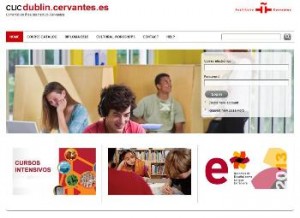 We are on vacation! Please, remember that Instituto Cervantes is closed during the month of August for the summer break. We will reopen on the 2nd of September.
We are on vacation! Please, remember that Instituto Cervantes is closed during the month of August for the summer break. We will reopen on the 2nd of September.
Our online services will be working as usual so, if you want to enrol in any of our courses, please visit our website at clicdublin.cervantes.es/en.
If you miss your beloved Spanish library and you are looking for books in Spanish, remember you have hundreds of audiobooks, e-books and other electronic resources, such as dictionaries and encyclopedias available for downloading or using online at our e-library section.
Queries and requests will be dealt with from the 2nd of September.
Have a nice summer!
¡Nos vamos de vacaciones! Recuerda por favor que el Instituto Cervantes de Dublín permanecerá cerrado durante el mes de agosto por ese motivo. Estaremos de vuelta el día 2 de septiembre.
Mientras tanto, nuestros servicios en línea seguirán funcionando como siempre, de modo que si quieres matricularte en cualquiera de nuestros cursos, puedes hacerlo a través de nuestra página web en clicdublin.cervantes.es/en.
Si echas de menos tu querida biblioteca española en Dublín y estás buscando material, recuerda que tienes cientos de audiolibros, libros electrónicos y otros recursos electrónicos como enciclopedias y diccionarios para descargar o para utilizar en línea en nuestra sección de biblioteca electrónica.
Cualquier solicitud de información tendrá que esperar hasta el día 2 de septiembre.
¡Que pases un feliz verano!
Film screening | Cine: Una hora más en Canarias
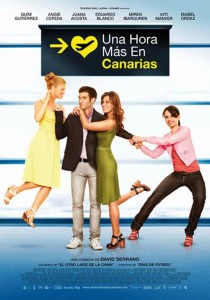
Una hora más en Canarias is the film that we bring you tomorrow at 6pm in Café Literario. Last month due to technical problems we had to interrupt the screening of this wonderful film. Now you have the chance to finally see it!
Claudia is an attractive thirty-five year old woman that has a goodlooking husband who worships her, a handsome son whom she adores and a lover who is even better looking and whom she adores even more. Life could not get any better. But Pablo, her lover, has decided that he has had enough of being no more than that and has left her for another woman. The heroine, who doesn’t take NO for an answer, is not prepared to let him slip through her fingers. With the help of her sister Mónica, and a spot of emotional and financial blackmail, she arranges what would seem to be a simple plan to get him back. But things do not go as planned and Pablo finds himself in the middle of three manipulative and strong women who will do whatever it takes to get what they want!
Una hora más en Canarias es la película que te traemos mañana a las 18:00 al Café Literario. El pasado mes de junio debido a problemas técnicos, nos vimos obligados a interrumpir la proyección de esta película. ¡Ahora tienes la oportunidad de verla finalmente!
Claudia, una mujer atractiva de treinta y cinco años, tiene un bonito café en el centro de Madrid, un marido guapo al que adora, un hijo guapo al que también adora y un amante aún más guapo al que adora aún más. Su vida no puede ser más perfecta, o eso parece, porque Pablo, su amante, ha decidido que está harto de ser solamente eso: su amante, y la ha dejado por Elena, una joven simpática, tierna, cariñosa… y con cierta propensión a la violencia cuando le quieren quitar al novio. Claudia, que no soporta perder ni a los chinos, no está dispuesta a dejarle escapar, así que con la ayuda de su hermana Mónica, y de un poco de chantaje económico y emocional, organiza lo que a primera vista parece un sencillo plan para recuperar a Pablo: llevárselo lejos de su novia, para poder seducirle más fácilmente. Aunque puede que las cosas se le compliquen un poco durante el proceso.
